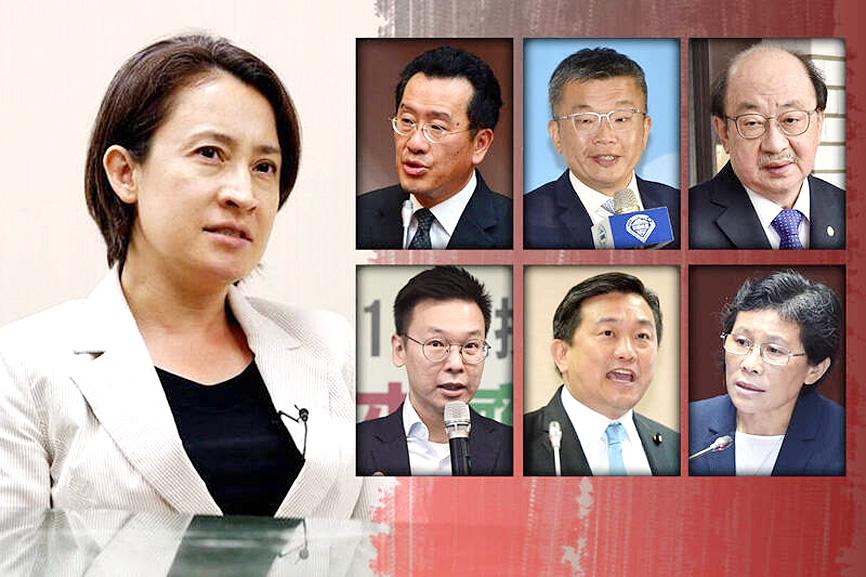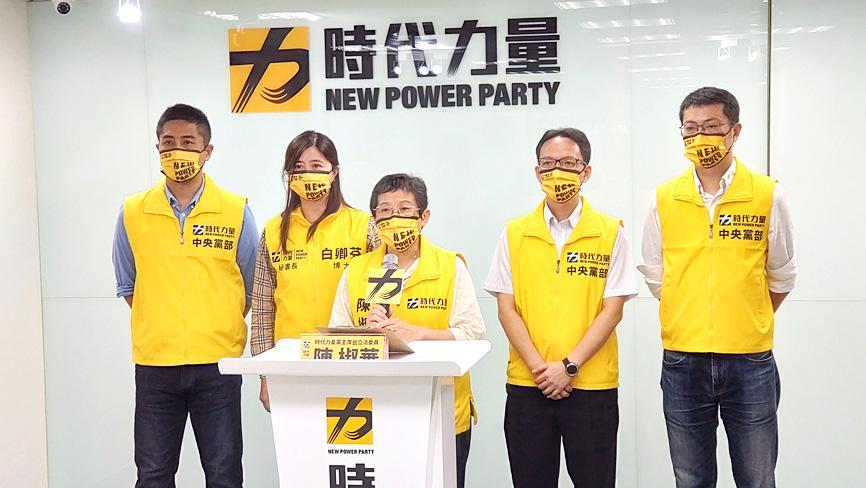The Ministry of Foreign Affairs (MOFA) yesterday slammed China for sanctioning Representative to the US Hsiao Bi-khim (蕭美琴) and six other Taiwanese officials for being “diehard separatists,” saying its attempt to intimidate Taiwanese would backfire.
China has no authority to dictate the actions of Taiwanese, because Taiwan is a democratic nation that upholds the rule of law, and would never yield to intimidation and threats from an authoritarian regime, ministry spokeswoman Joanne Ou (歐江安) told a news conference in Taipei.
China’s state-run Xinhua news agency earlier yesterday reported that the Taiwan Work Office of the Chinese Communist Party Central Committee has imposed sanctions against Hsiao and other “diehard Taiwanese independence separatists.”

Photo compiled by the Taipei Times
In addition to Hsiao, National Security Council Secretary-General Wellington Koo (顧立雄), Deputy Legislative Speaker Tsai Chi-chang (蔡其昌), Democratic Progressive Party (DPP) caucus whip Ker Chien-ming (柯建銘), DPP Deputy Secretary-General Lin Fei-fan (林飛帆), DPP Legislator Wang Ting-yu (王定宇) and New Power Party (NPP) Chairwoman Chen Jiau-hua (陳椒華) were added to the sanctions list, Xinhua reported.
Premier Su Tseng-chang (蘇貞昌), Legislative Speaker You Si-kun (游錫堃) and Minister of Foreign Affairs Joseph Wu (吳釗燮) have been on the list since it was made public in November last year.
The people on the list and their family members are banned from entering China, Hong Kong and Macau, Xinhua reported.

Photo: Yang Cheng-yu, Taipei Times
The sanctions are unlikely to have any practical effect, as senior Taiwanese officials do not visit China.
Their affiliated institutions are restricted from cooperating with organizations and individuals in China, and enterprises related to them cannot engage in business activities in the country, Xinhua said.
The people on the list have gone to great lengths to “collude with external forces” in provocations advocating Taiwanese independence and pose a grave danger to “Chinese national rejuvenation,” Xinhua quoted an office spokesperson as saying.
China’s efforts to deter people from speaking up for Taiwan by targeting politicians and opinion leaders who have worked to enhance Taiwan’s international visibility would only backfire, as it would foster resentment among Taiwanese, Ou said.
The Mainland Affairs Council said the sanctions were “illegal” and “ineffective,” as Taiwan and China do not have jurisdiction over each other.
The government would respond to the sanctions with “necessary measures in a timely manner” to avoid adverse effects, and ensure national security and the public interest, it added.
Lin said on Facebook that he felt “honored” to be sanctioned by an authoritarian regime, adding that he considered it as a “sign of being part of the free world.”
When news of the sanctions came out, many of his friends working in the foreign media, the diplomatic corps and at think tanks sent him congratulatory messages, Lin said.
Chen said that she “felt extremely honored” for being sanctioned, as it shows that Beijing recognizes her determination to defend Taiwan’s sovereignty and democratic values.
“The NPP and I will continue to stand firm on Taiwanese values. Taiwan is an independent, sovereign nation and I am Taiwanese. My determination to defend Taiwan’s democracy and freedom will never change,” she told a news conference in Taipei.
Additional reporting by Shelley Shan

DAREDEVIL: Honnold said it had always been a dream of his to climb Taipei 101, while a Netflix producer said the skyscraper was ‘a real icon of this country’ US climber Alex Honnold yesterday took on Taiwan’s tallest building, becoming the first person to scale Taipei 101 without a rope, harness or safety net. Hundreds of spectators gathered at the base of the 101-story skyscraper to watch Honnold, 40, embark on his daredevil feat, which was also broadcast live on Netflix. Dressed in a red T-shirt and yellow custom-made climbing shoes, Honnold swiftly moved up the southeast face of the glass and steel building. At one point, he stepped onto a platform midway up to wave down at fans and onlookers who were taking photos. People watching from inside

A Vietnamese migrant worker yesterday won NT$12 million (US$379,627) on a Lunar New Year scratch card in Kaohsiung as part of Taiwan Lottery Co’s (台灣彩券) “NT$12 Million Grand Fortune” (1200萬大吉利) game. The man was the first top-prize winner of the new game launched on Jan. 6 to mark the Lunar New Year. Three Vietnamese migrant workers visited a Taiwan Lottery shop on Xinyue Street in Kaohsiung’s Gangshan District (崗山), a store representative said. The player bought multiple tickets and, after winning nothing, held the final lottery ticket in one hand and rubbed the store’s statue of the Maitreya Buddha’s belly with the other,

‘NATO-PLUS’: ‘Our strategic partners in the Indo-Pacific are facing increasing aggression by the Chinese Communist Party,’ US Representative Rob Wittman said The US House of Representatives on Monday released its version of the Consolidated Appropriations Act, which includes US$1.15 billion to support security cooperation with Taiwan. The omnibus act, covering US$1.2 trillion of spending, allocates US$1 billion for the Taiwan Security Cooperation Initiative, as well as US$150 million for the replacement of defense articles and reimbursement of defense services provided to Taiwan. The fund allocations were based on the US National Defense Authorization Act for fiscal 2026 that was passed by the US Congress last month and authorized up to US$1 billion to the US Defense Security Cooperation Agency in support of the

‘COMMITTED TO DETERRENCE’: Washington would stand by its allies, but it can only help as much as countries help themselves, Raymond Greene said The US is committed to deterrence in the first island chain, but it should not bear the burden alone, as “freedom is not free,” American Institute in Taiwan Director Raymond Greene said in a speech at the Institute for National Defense and Security Research’s “Strengthening Resilience: Defense as the Engine of Development” seminar in Taipei yesterday. In the speech, titled “Investing Together and a Secure and Prosperous Future,” Greene highlighted the contributions of US President Donald Trump’s administration to Taiwan’s defense efforts, including the establishment of supply chains for drones and autonomous systems, offers of security assistance and the expansion of